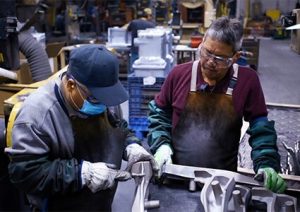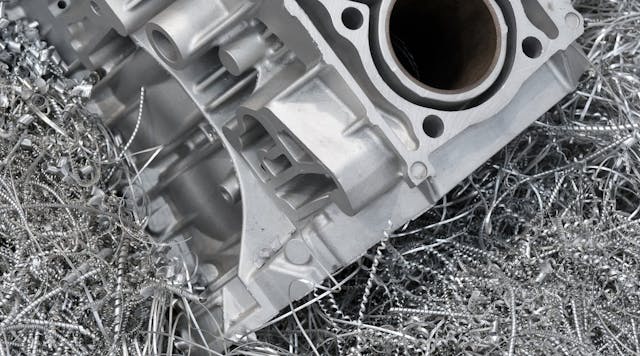Understanding the Advantages and Innovations in the Aluminum Foundry Market
The Aluminum Foundry sector plays a necessary role in modern production. Its light-weight properties notably enhance fuel efficiency, particularly in automobile and aerospace fields. Furthermore, Aluminum's resistance to deterioration warranties long life in numerous applications. As the market evolves, advancements such as advanced recycling and additive production are improving production techniques. Discovering these advancements exposes not just the benefits but also the difficulties in advance for Aluminum shops in a swiftly transforming market.
The Lightweight Benefit of Aluminum
Aluminum's lightweight nature uses considerable benefits across numerous sectors, specifically in manufacturing and transport. Its reduced thickness permits for the production of elements that are less complicated to take care of and install, leading to lowered labor expenses and enhanced effectiveness. In the automobile field, lighter automobiles add to improved gas economic situation and reduced emissions, aligning with global sustainability goals. In aerospace, the use of Aluminum lowers the total weight of airplane, which is critical for enhancing efficiency and lowering operational prices.
Furthermore, Aluminum's lightweight residential or commercial properties promote ingenious layouts that were formerly impossible with much heavier products. This adaptability enables makers to produce complicated forms and structures while keeping architectural stability. Generally, the light-weight advantage of Aluminum not only improves product performance however likewise drives advancements in innovation and layout, making it a preferred material in different applications.
Deterioration Resistance and Sturdiness
The Aluminum Foundry market is renowned for creating materials with exceptional rust resistance, making them perfect for various applications. This residential property, combined with improved architectural honesty, contributes to the lasting efficiency advantages that Aluminum parts supply. Because of this, industries progressively rely upon Aluminum to fulfill demanding environmental conditions without compromising top quality.
Superior Corrosion Resistance
While various metals face considerable obstacles from ecological aspects, Aluminum stands out for its exceptional rust resistance, making it a favored option in lots of applications. This home is mainly due to a natural oxide layer that forms on the Aluminum surface, providing an obstacle versus moisture and destructive agents. Unlike other steels that might rust or degrade over time, Aluminum maintains its integrity also in rough settings, such as seaside areas or industrial settings. In addition, its light-weight nature incorporated with rust resistance makes it suitable for applications in aerospace, automotive, and marine sectors. In general, Aluminum's outstanding longevity not just enhances item durability however also minimizes maintenance prices, providing an engaging advantage for manufacturers and customers alike.
Improved Structural Honesty
Engineers and developers increasingly recognize the relevance of boosted structural stability in contemporary applications, where both rust resistance and longevity are important. Aluminum alloys, known for their light-weight properties, likewise exhibit phenomenal resistance to rust, making them suitable for extreme environments. The ingenious strategies utilized in the Aluminum Foundry market add considerably to creating parts with improved toughness. Advanced casting processes and alloy compositions are tailored to fulfill details performance requirements, guaranteeing that structures can hold up against severe conditions without compromising stability. Surface treatments and coverings enhance the life expectancy of Aluminum items, better minimizing damage over time. This focus on improved structural integrity not only prolongs the functionality of materials however additionally reduces upkeep prices, strengthening Aluminum's position as a material of choice in various sectors.
Lasting Performance Advantages
Long-lasting efficiency in Aluminum parts is mostly attributed to their remarkable corrosion resistance and resilience. Unlike many metals, Aluminum naturally forms a safety oxide layer, which stops corrosion and deterioration in different environments, including marine and industrial setups. This integral residential or commercial property considerably prolongs the life expectancy of Aluminum products, minimizing upkeep and replacement prices. In enhancement, the lightweight nature of Aluminum boosts its applicability throughout markets without compromising toughness. The material's resistance to damage additionally contributes to its integrity sought after applications, making it a suitable choice for auto, aerospace, and building and construction industries. As industries significantly prioritize sustainability and long life, Aluminum's performance advantages align with modern-day engineering requirements, solidifying its duty in cutting-edge manufacturing processes.
Environmental Impact and Sustainability
 As the Aluminum Foundry sector develops, it progressively focuses on environmental influence and sustainability, acknowledging the demand for liable methods despite environment change. Efforts to lessen waste and power consumption are at the have a peek here center, with many foundries embracing reusing initiatives to redeem Aluminum scrap. This not just reduces resources usage but likewise significantly lowers power expense, as recycled Aluminum requires only a portion of the power contrasted to primary production.
As the Aluminum Foundry sector develops, it progressively focuses on environmental influence and sustainability, acknowledging the demand for liable methods despite environment change. Efforts to lessen waste and power consumption are at the have a peek here center, with many foundries embracing reusing initiatives to redeem Aluminum scrap. This not just reduces resources usage but likewise significantly lowers power expense, as recycled Aluminum requires only a portion of the power contrasted to primary production.Moreover, innovations in exhausts control technologies are being implemented to reduce air contaminants, lining up procedures with stricter environmental guidelines. Shops are also checking out different power resources, such as solar and wind, to power their facilities sustainably. By fostering collaboration with stakeholders, the sector intends to establish cutting-edge remedies that boost eco-friendly stewardship. Jointly, these campaigns highlight a dedication to minimizing the Aluminum Foundry's carbon footprint while advertising a round economic situation within the manufacturing industry.
Advanced Manufacturing Techniques
 Transforming production processes, the Aluminum Foundry sector is progressively incorporating sophisticated manufacturing techniques to improve efficiency and accuracy. Methods such as computer system mathematical control (CNC) machining and additive manufacturing have actually become essential parts in optimizing manufacturing process. CNC machining permits high-precision part fabrication, substantially minimizing material waste and manufacturing time. Additive production opens brand-new avenues for complicated geometries and light-weight designs that were formerly hard to achieve.
Transforming production processes, the Aluminum Foundry sector is progressively incorporating sophisticated manufacturing techniques to improve efficiency and accuracy. Methods such as computer system mathematical control (CNC) machining and additive manufacturing have actually become essential parts in optimizing manufacturing process. CNC machining permits high-precision part fabrication, substantially minimizing material waste and manufacturing time. Additive production opens brand-new avenues for complicated geometries and light-weight designs that were formerly hard to achieve.Furthermore, the release of automation and robotics in Aluminum factories enhances operations, lessens human error, and boosts employee safety. These innovations promote a more responsive manufacturing environment, making it possible for producers to adapt promptly to market needs. The integration of sophisticated simulation software further improves the layout and screening stages, resulting in premium item high quality. Jointly, these methods not just boost functional performance yet also foster development, positioning a fantastic read the Aluminum Foundry market at the center of modern manufacturing.
Advancements in Recycling Processes
The Aluminum Foundry market is not only progressing in manufacturing methods however is also making significant strides in reusing processes. Innovations are emerging to enhance the efficiency of recycling methods, reducing power intake and boosting sustainability. Advanced arranging innovations, such as automatic optical sorting, enable the identification and splitting up of Aluminum from various other materials with high accuracy. This causes a higher quality of recycled Aluminum, which is essential for keeping the honesty of the end products.
In addition, closed-loop recycling systems are being carried out, allowing makers to reuse Aluminum scrap within their very own production procedures. This minimizes waste and advertises a round economic situation. Additionally, study into brand-new recycling methods, such as hydrometallurgical processes, uses the potential for recuperating Aluminum from intricate waste streams. These technologies not only add to decreasing the carbon impact of the Aluminum Foundry industry yet also boost its financial practicality in a progressively environmentally conscious market.
Applications Throughout Numerous Industries
Various industries are progressively identifying the versatility and benefits of Aluminum Foundry items, leading to extensive applications throughout fields such as automobile, building and construction, consumer, and aerospace products. In the automobile industry, Aluminum castings add to light-weight automobile designs, enhancing fuel efficiency and efficiency. Aerospace suppliers make use of Aluminum parts for their strength-to-weight ratio, important for aircraft structures and parts.
In building and construction, Aluminum is preferred for its resilience and resistance to corrosion, making it optimal for window frames, roofing, and structural supports. Customer items likewise benefit from Aluminum Foundry products, as seen in kitchenware, electronic devices, and product packaging, where lightweight and recyclable materials are vital.
The adaptability of Aluminum Foundry methods permits complex designs and precise requirements, dealing with the varied demands of these markets. Because of this, Aluminum Foundry products are ending up being integral to modern-day production processes across different markets.
Future Fads in Aluminum Foundries
As markets continue to develop, Aluminum factories are positioned to embrace numerous crucial fads that promise to enhance efficiency and sustainability. One noticeable trend is the raising fostering of digital innovations, including automation and synthetic intelligence, which simplify procedures and improve quality assurance. Furthermore, the push in the direction of lasting practices is leading shops to invest in reusing innovations, significantly lowering waste and energy consumption.
 An additional emerging fad is making use of innovative alloys and materials, catering to the growing need for durable and lightweight components throughout numerous sectors (Aluminum Foundry). Additionally, the assimilation of additive manufacturing methods is expected to transform component design, supplying personalization and minimizing preparations
An additional emerging fad is making use of innovative alloys and materials, catering to the growing need for durable and lightweight components throughout numerous sectors (Aluminum Foundry). Additionally, the assimilation of additive manufacturing methods is expected to transform component design, supplying personalization and minimizing preparationsCollaboration with research establishments is also expected to drive advancement, as shops look for why not find out more to create brand-new processes and products. Aluminum Foundry. Jointly, these fads show a transformative future for the Aluminum Foundry sector, lining up with more comprehensive objectives of sustainability and performance
Frequently Asked Questions
What Are the Regular Expenses Connected With Aluminum Foundry Manufacturing?
The regular prices connected with Aluminum Foundry production include resources, labor, power, equipment upkeep, and overhead expenditures. These elements collectively influence the overall financial investment required for reliable Aluminum casting procedures.
How Does Aluminum Compare to Various Other Steels in Toughness?
Aluminum, while lighter than several steels, displays remarkable strength-to-weight ratios. Compared to steel, Aluminum is less strong yet uses superb deterioration resistance, making it a desirable option in applications where weight and durability are crucial.
What Safety Measures Remain In Place in Aluminum Foundries?
Safety measures in Aluminum shops commonly include obligatory individual protective equipment, air flow systems to manage fumes, regular tools maintenance, training programs for staff members, and adherence to stringent safety guidelines to decrease dangers connected with liquified metal handling.
Just How Is Quality Assurance Managed in Aluminum Spreading Processes?
Quality control in Aluminum spreading processes includes strenuous examinations at different phases, including resources assessment, procedure monitoring, and last item screening. Methods such as analytical process control and non-destructive screening warranty adherence to sector requirements.
What Qualifications Are Essential for Aluminum Foundry Providers?
The importance of qualifications for Aluminum Foundry suppliers consists of ISO 9001 for top quality management, ISO 14001 for ecological monitoring, and industry-specific standards like ASTM and SAE, making sure conformity, security, and integrity in making procedures.
The Aluminum Foundry market plays a necessary role in contemporary manufacturing. The Aluminum Foundry market is renowned for generating products with superior rust resistance, making them excellent for various applications. Transforming manufacturing procedures, the Aluminum Foundry sector is increasingly incorporating sophisticated production methods to boost performance and precision. The Aluminum Foundry sector is not just progressing in making strategies however is additionally making significant strides in reusing procedures. As industries proceed to progress, Aluminum shops are positioned to embrace several crucial patterns that guarantee to boost efficiency and sustainability.